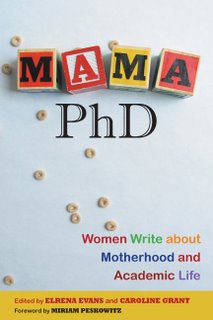New book from Laura Levitt!
December 7th, 2007Temple University professor Laura Levitt’s new book, American Jewish Loss After the Holocaust (New York University Press) is out now; Laura’s Mama, PhD essay, “On Being Phyllis’s Daughter: Thoughts on Academic Intimacy,” is based on a chapter from the book. Here’s a small taste:
On the one hand, my mother adhered to the norms of mothering that defined her early 1960’s generation. Although she was educated and worked as a teacher before she had children, she left her job when my brother and I were very young, and did not go back to teaching for almost five years.
But on the other hand—this is not exactly where I wanted to begin. I wanted to start by saying that my mother, like me, played with dolls. Her favorites, so she tells me, were paper dolls. She spent long days as a little girl cutting out various outfits, experimenting with how they looked. I think about my mother playing with paper dolls when I think about her accounts of what she did during her long days at home with me as a young child. For my mother, staying at home was not easy. She loved teaching, and regretted giving up her job when I was born.
I have few memories of my mother at home with my brother and me. I have memories of playing with friends and a spattering of memories of other adults, but I do not have any clear memories of my mother. What my mother tells me is that she spent a lot of her time cleaning and ironing my various outfits and dressing me up in them. I cannot help but imagine that, in part, my role was quite similar to that of her paper dolls. She did the labor in order to get my clothes ready for me to wear, and then spent her days putting them on and taking them off me. What I recall are itchy crinolines and a longing to take them off, and short lacy socks that needed to be pulled up over my heels again and again. I think I sensed, even then, that my mother was not particularly happy staying home.
Not surprisingly, it was when my mother returned to work that my most vivid memories of her began. My mother’s passion for her work was contagious. I imbibed it. I fell in love with her students and her colleagues, their stories, their intrigues, and always my mother at the center of all of this story telling. Over the years, my specialized knowledge of my mother and her life at school has enabled a kind of intimacy between us. It allows me to share a part of her life, as we communicate through the mediation of other people and their stories. Not unlike a beloved text, these stories have enabled my mother and me to connect in ways that seemed to foreshadow the kinds of academic intimacy I now share with many of my own students. My mother and I have always communicated most profoundly in this way, and this is very much the kind of intimacy I know best in my own life.


 Join us on Facebook
Join us on Facebook